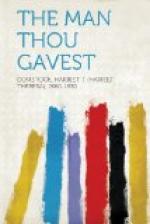“Your uncle,” McPherson was saying, “tied hand and foot as he was, looked far and wide during his years of illness. I thought I knew, thought I understood him; but since his death I have almost felt that he was inspired. It’s a damnable pity that our stupidity and callousness prevent us realizing in life what we are quick enough to perceive in death—when it is too late! Truedale’s faith in me, when I gave him so little to go by, is both flattering and touching. He knew he could trust me—and that knowledge is the best thing he bequeathed to me. But I expect you to do your part, boy, and by so doing to justify much that might, otherwise, be questioned. To begin with, as you have just heard, the sanatorium for cases like your uncle’s is to be begun at once. Now there is a strip of land, which, should it suit our purpose, can be had at great advantage if taken at once, and for cash. We will run down to see it this week and then we’ll know better where we stand.”
“I’d like,” Truedale coloured quickly, “to return to Pine Cone for a few days. I could start at once. You see I left rather suddenly and brought—”
But McPherson laughed and waved his hand in the wide gesture that disposed of hope and fear, lesser business and even death itself, at times.
“Oh! Jim won’t tamper with anything. Certainly your traps are safe enough there. Such things can wait, but this land-deal cannot. Besides there are men to see: architects, builders, etc. The wishes of your uncle were most explicit. The building, you recall, was to be begun within three months of his death. Having all the time there was, himself, he has left precious little for others.”
Again the big laugh and wide gesture disposed of Pine Cone and the tragic affairs of little Nella-Rose. Unless he was ready to lay bare his private reasons, Truedale saw he must wait a few days longer. And he certainly had no intention of confiding in McPherson.
“Very well, doctor,” he said after a slight pause, “set me to work. I want you to know that as far as I can I mean—too late, as you say—to prove my good intentions at least to—my uncle.”
“That’s the way to talk!” McPherson rose and slapped Conning on the back. “I used to say to old Truedale, that if he had taken you more into his confidence, he might have eased life for us all; but he was timid, boy, timid. In many ways he was like a woman—a woman hurt and sensitive.”
“If I had only known—only imagined”; Conning was walking toward the door; “well, at least I’m on the job now, Dr. McPherson.”




